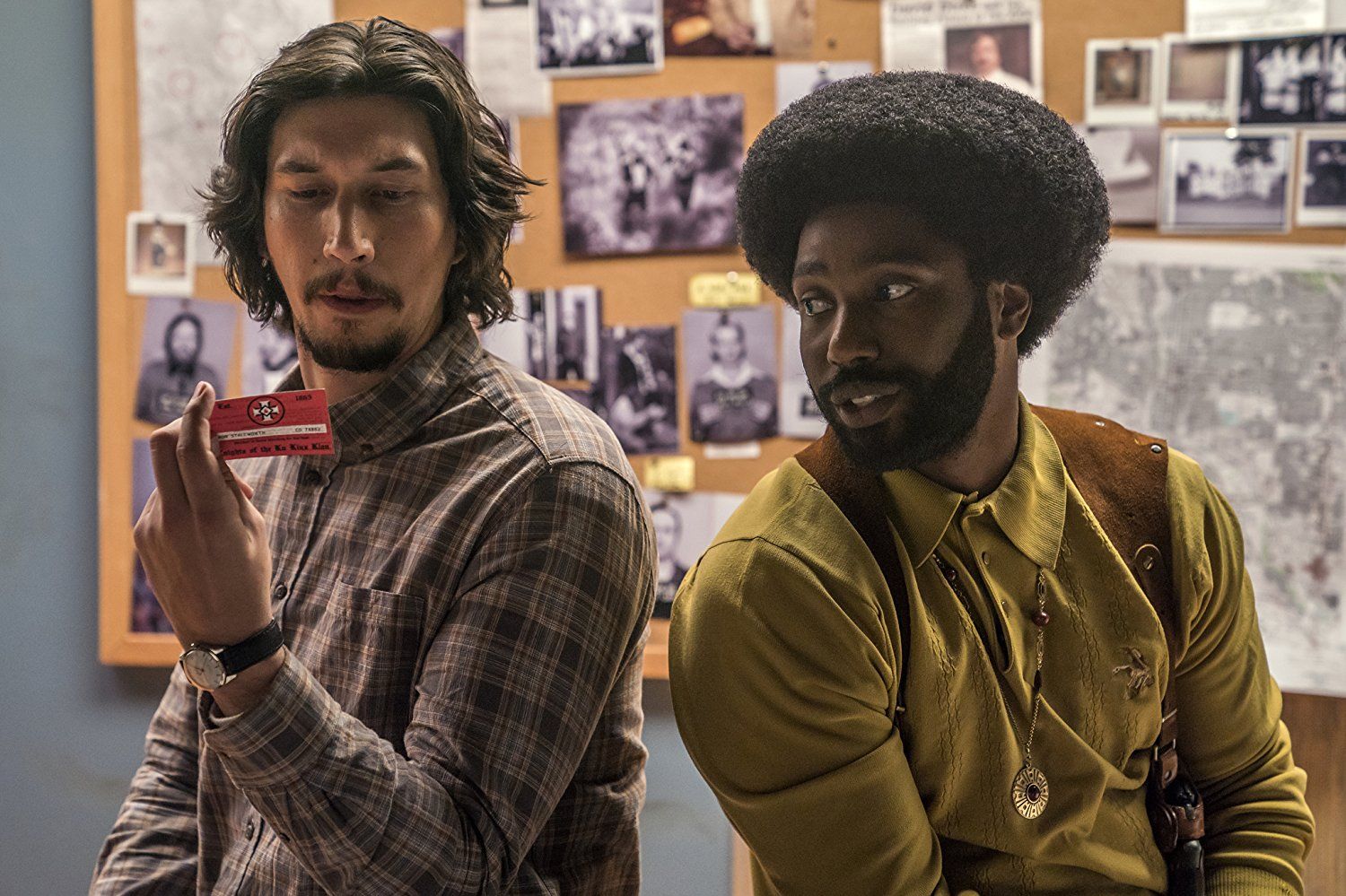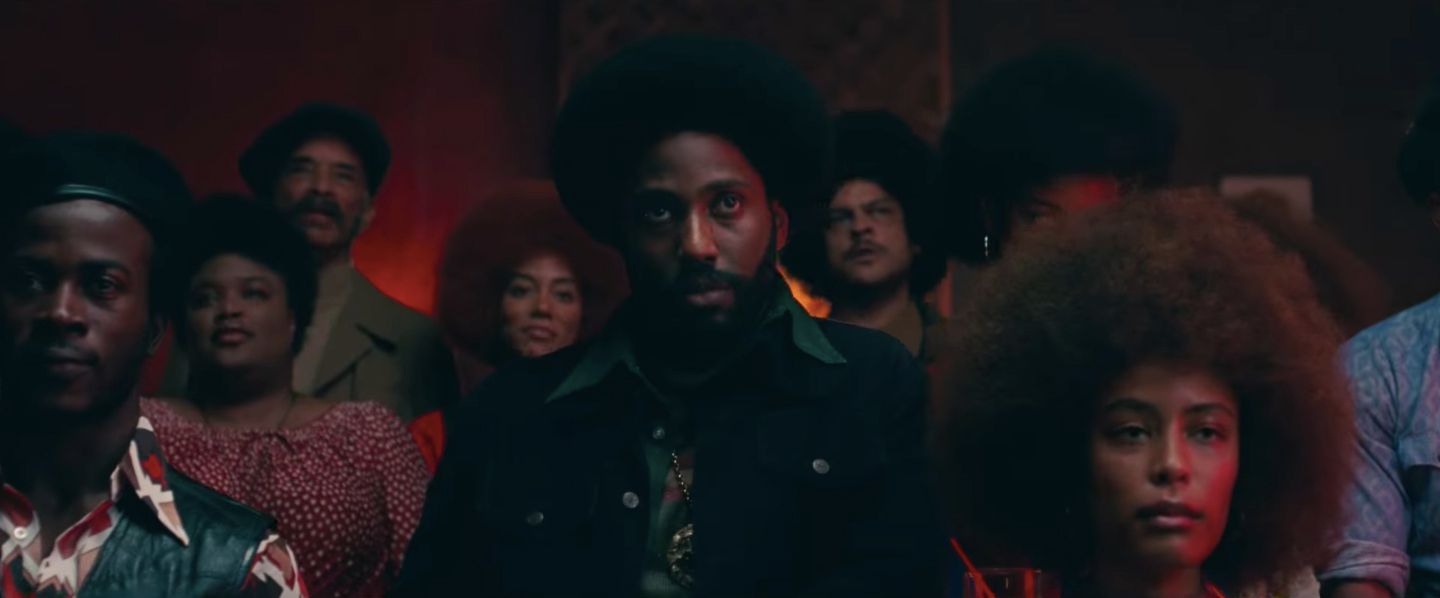BlacKkKlansman, based on a true story of a black cop leading an investigation into the KKK in 1970's Colorado Springs, opens by acknowledging the role fictionalizations of the past play in manipulating our ideas about it. The first thing we see is the famous field hospital crane shot from Gone with the Wind—a film that is a problematic classic text, a work of confederate nostalgia, and one of golden age studio system filmmaking’s pinnacles of craft. In the original context, it’s supposed to be a shot for which the audience marvels at the enormity, a field of extras steadily revealed by the unblinking awe of the camera movement, and feels sorrow for the good old boys wounded and writhing en masse. Here, though, isolated and placed at the beginning of a Spike Lee film, there’s an extra layer of exhausted sorrow added on top of its dazzling construction. It’s a strong feeling of disgust. I was thinking, "what a waste," reacting not just to the dead and dying humanity, but their legacy. All these white boys dead and dying for the right to uphold a racist institution, to cling to wealth and status built on the backs of enslaved people of color. How misguided, and how damaging to our long-term societal health to imbue these images with a noble suffering, to take them at their word when they claim it was merely a principled stand for freedom and states rights. To strip the Civil War's losers of their full aim is to ultimately allow them to win. They lost the war, they lost their slaves, but white supremacy reigns.
This white-washed Confederate pride has resonated through the century and a half since the war's end. It’s a cultural poison that trickles down. Confederate vets were allowed to stubbornly cling to their wounded righteousness. Griffith’s 1915 epic Birth of a Nation rebirthed the KKK for an age of Jim Crow lynchings. Margaret Mitchell’s nostalgia-tinged Wind told a story of charmed plantation melodrama torn asunder while marginalizing and excusing prejudice under the guise of old-fashioned courtly Southern rituals. These cultural signposts have perpetuated decades after decades the comfort pathetic and desperate whites find in their racism, the belief that, as MLK said, they may be poor, but at least they’re not black. Of course, affluent, privileged whites can be racist, too. They let the impoverished fester to prop up their middle class power (codified in zoning boards and police officers) or demagogic notoriety (David Duke’s trading of a white hood for a callow suit-and-tie PR speak; GOP congressmen winking and dog whistling; a president who can only bring himself to condemn racism if he pretends there are good people “on both sides” of the issue). As BlacKkKlansman begins it cuts from Wind to a white supremacist in a suit (Alec Baldwin) frothing at the mouth as he films a propaganda lecture. He speaks of his ideas of his God-given superiority, while Lee's fragmented cutting and unflinching eye for the character's stuttering sputtering put such superiority as the lie it is. Fictions within fictions, white grievance is just a story the racist tell themselves.
That Lee’s film is engaged with this cultural continuum, and is also a crackling procedural, an enormously satisfying Hollywood product, and a riotously funny, rousingly tense genre film, is to his credit. Always a master of mixing tones — his films swerving wildly to build moods and generate ideological conversation, as exuberantly didactic as they can be deliberately, productively contradictory — here he’s executing some of the tightest, swiftest, hairpin turns of his career. Laughs catch in the throat. Tension is cut with absurdity. Character is embodied in action, politics in the personal. Catharsis arrives big and broad, but hardly stamps out the simmering contradictions, open questions, and unresolved danger underneath. It builds a fiction from facts to tell us a (US A?) truth. As the story proper begins, Ron Stallworth (John David Washington) steps into the Colorado Springs police department to be hired as the force's first black officer. He's warned by the chief that the other officers might use racial slurs against him. "Will that happen?" Stallworth earnestly asks. His naivety is played up as part of a political awakening, as one of his first tasks is to infiltrate a black student group, as befits the time period's bigoted policing and surveillance priorities. (How many earnest young political organizations were taken down by a law enforcement apparatus that dismantled, discredited, and violently opposed progressive racial politics while ignoring the very real threat of white-wing terrorists bubbling up beneath mainstream attention?) Stallworth falls for the group's leader (Laura Harrier) who doesn't know he's a cop. (They fall in love during an ecstatic dance number set to, thematically appropriate, "Too Late to Turn Back Now.") She says all cops are pigs. Why, that very night, a racist cop pulls her over for no reason other than to humiliate and intimidate. Stallworth asks if it's possible a good cop could change things from the inside. She says no. She has good reasons. How does Stallworth feel about this? How to square the idea that he's trying to help the public in his position of power and the fact that the system of power is built to protect his people's abusers?
The question is a live wire, as unresolved and electric as the idea of the movie itself, Lee choosing to make a film with a black cop hero in a time of renewed attention to police brutality. It's not for no reason he has his heroes name check Shaft and Cleopatra Jones, black power made institutional. In this inside-out capacity, Stallworth, seemingly on a whim, though clearly with the contradictions of racial and political identity swirling within him, calls up the local KKK chapter and convinces them to let him apply for membership. Obviously, this calls for the police to assign him a white partner (Adam Driver) to do the face-to-face undercover investigations. Together, they act as one. It leads to a film of dogged detective work, two cops shot and framed like a lost blaxploitation pairing or TV cop procedural, bantering and bonding as they break out the wires and tails and telephoto lenses. Every step is dangerous, as the vile and profane racists whose inner sanctums they infiltrate would clearly not react well to discovering they're subjects of a police investigation led by a black man and his Jewish colleague. There's a razor-wire tension to these sequences, cut with huge laughs that never undermine the seriousness of the situation. The Klansmen are portrayed as deeply buffoonish men who blunderingly believe themselves superior. Their ideology is treated, rightfully so, as a joke. And yet the dangerousness of these ideas is never once diminished or laughed off. They wave around guns, conspire with mysterious military-trained men, burn crosses, and plan to procure explosives. They may be idiots, but they are idiots poisoned by racist views of the world, and armed with deadly weapons and the intent to use them. Stallworth eventually strikes up a phone conversation with David Duke (Topher Grace), who assures his white friend (ha ha) that he knows a black man when he hears one (ha ha). White supremacy is a dangerous fool's game, but there are always more fools to follow them.
In the end, Lee builds to a beautifully satisfying climax, a chain-reaction of exceptional catharsis that crashes into cold reality. What does this investigation, so entertainingly recounted, ultimately reveal? Nothing that couldn't have been easily known before. What did it prevent? Not much, as no matter the outcome for these individual characters, the core KKK ideas remained very much intact, ready to rear their ugly head through all manner of recurring racist policies, politicians, and violence over the forty years since. The film allows small victory, but ends its fiction with the sign of a burning cross out the window, two characters approaching in a trademark Lee double-dolly shot, drawn inevitably into the future where racism must always be confronted. Once the fight has begun, one must remain ever vigilant. A key sequence intercuts a Klan rally induction with black activists listening as an elder statesman (Harry Belafonte) movingly, harrowingly tells of a lynching he witnessed as a boy. Two groups engaged with their history, one finding comfort and fervor in racist lies of imagined grievance told to maintain a false sense of power over others, the other emboldened to pay respect to the true violence done to their ancestors (not even that far back--their grandparents, their parents, themselves) by claiming a right to shared power and equality. In dramatizing this struggle, Lee finds great humor and suspense along the way, but leaves us with the cold realization that small victories, be it for a black undercover Klansman or for the Union army, can always be undermined. Sure enough, look at the news. This, Lee says, is an emergency. BlacKkKlansman makes fiction out of the past to begin to right (and write and write) the wrongs left by fictions past.



No comments:
Post a Comment